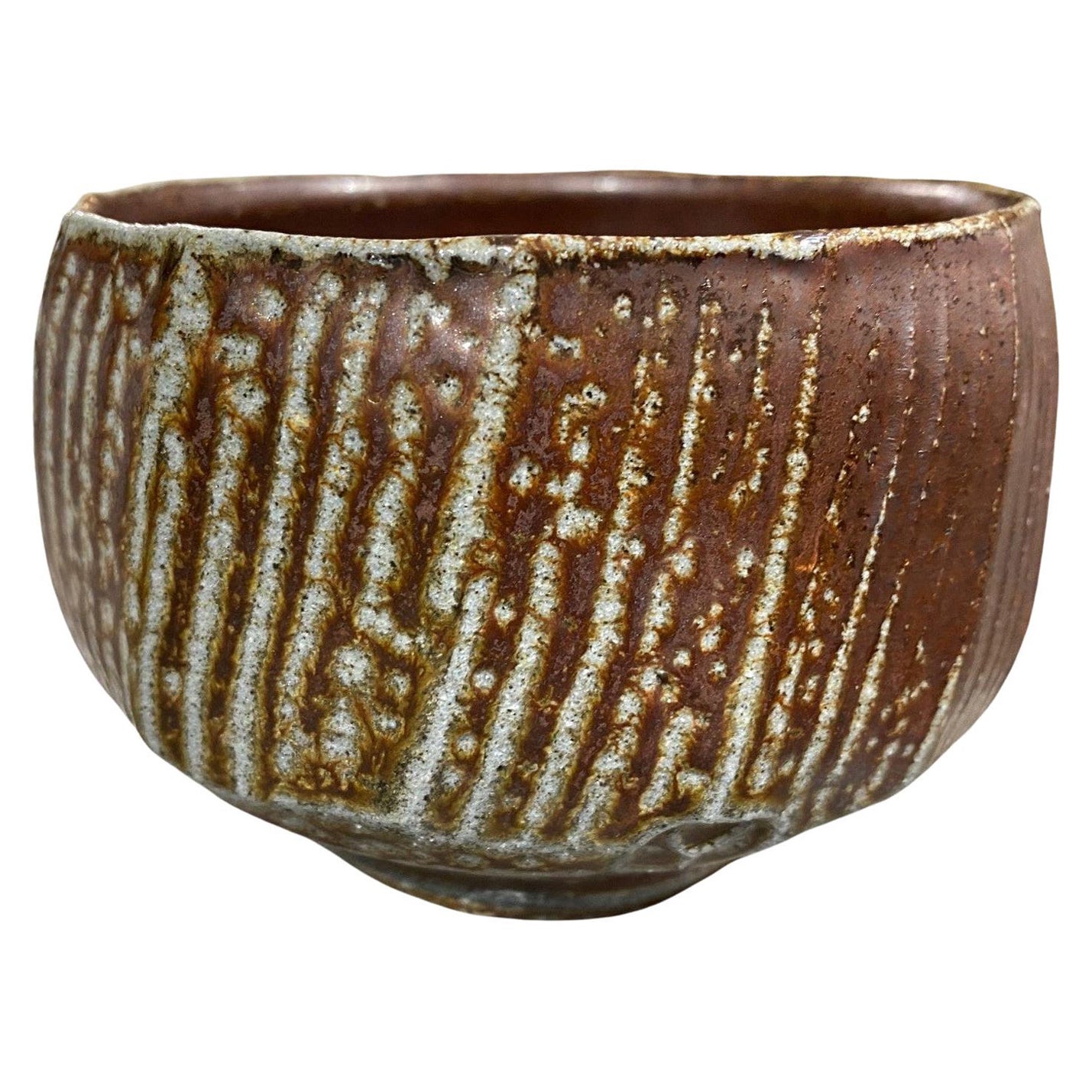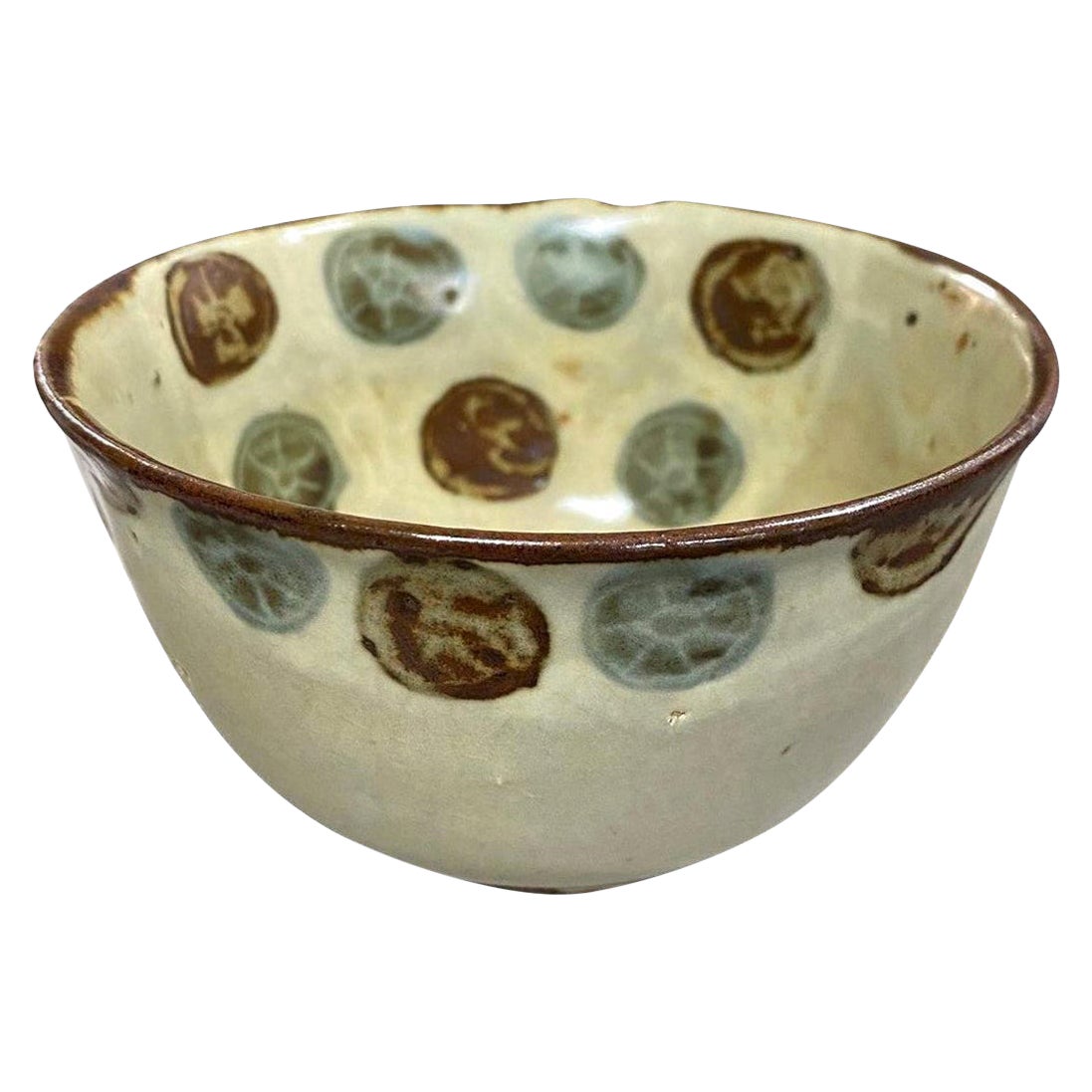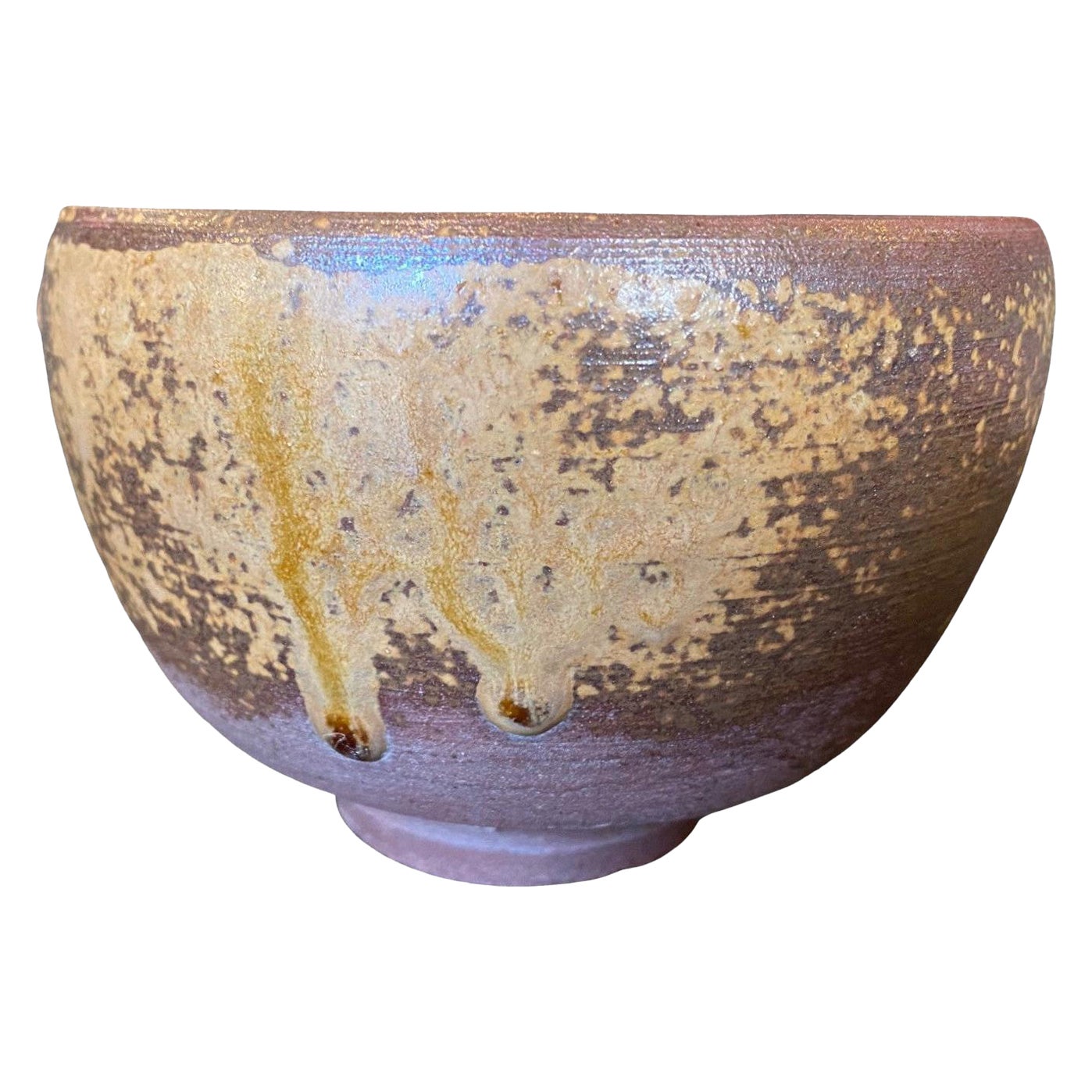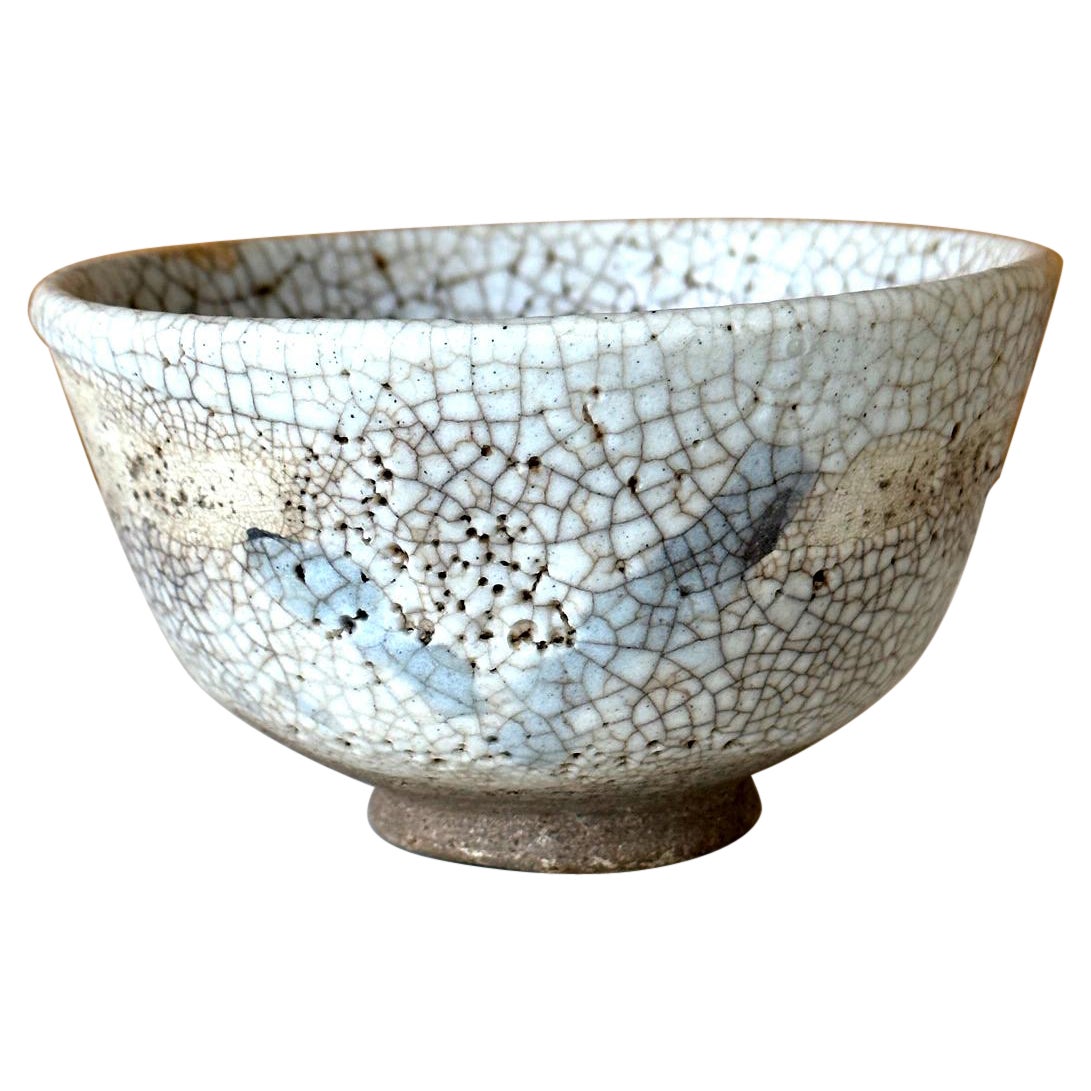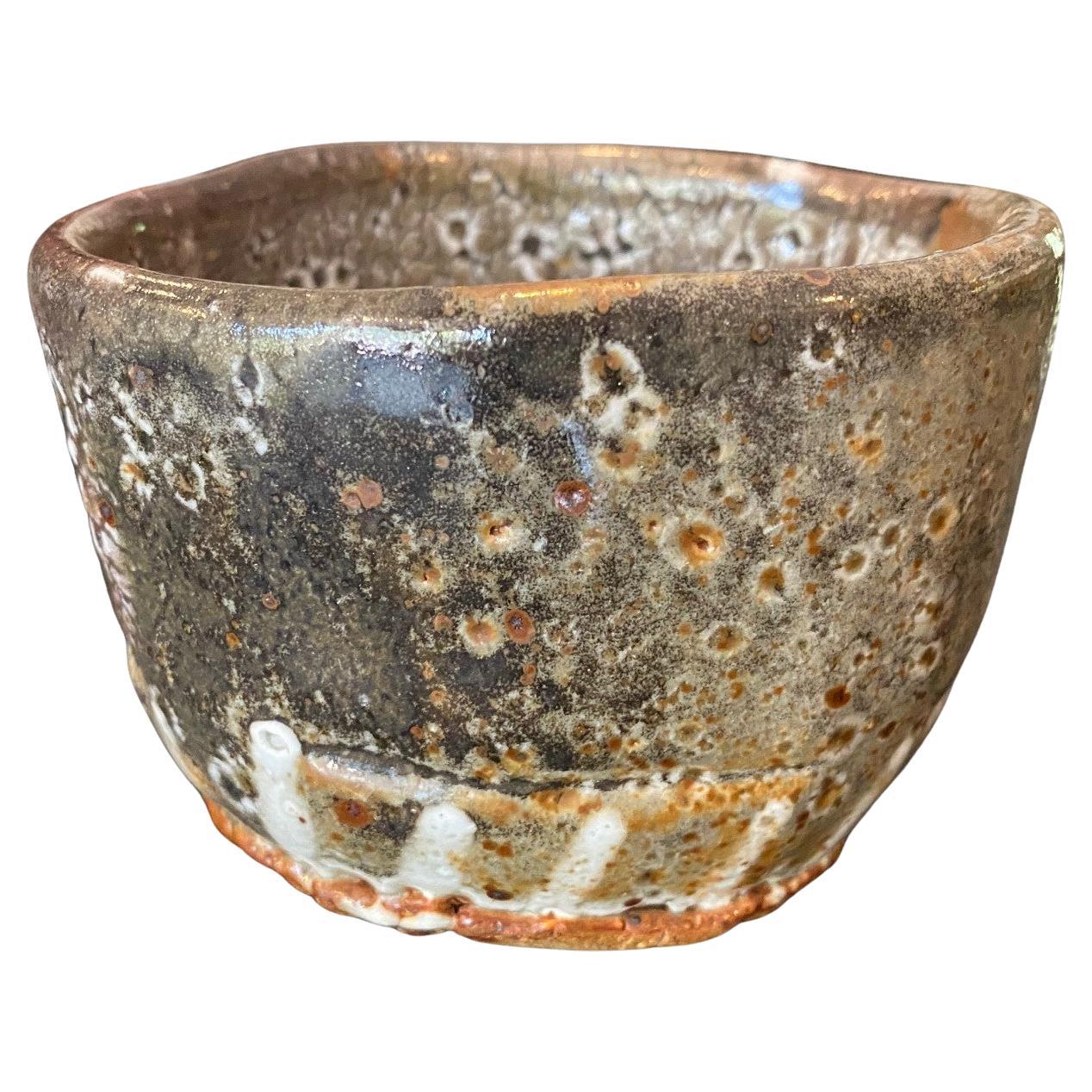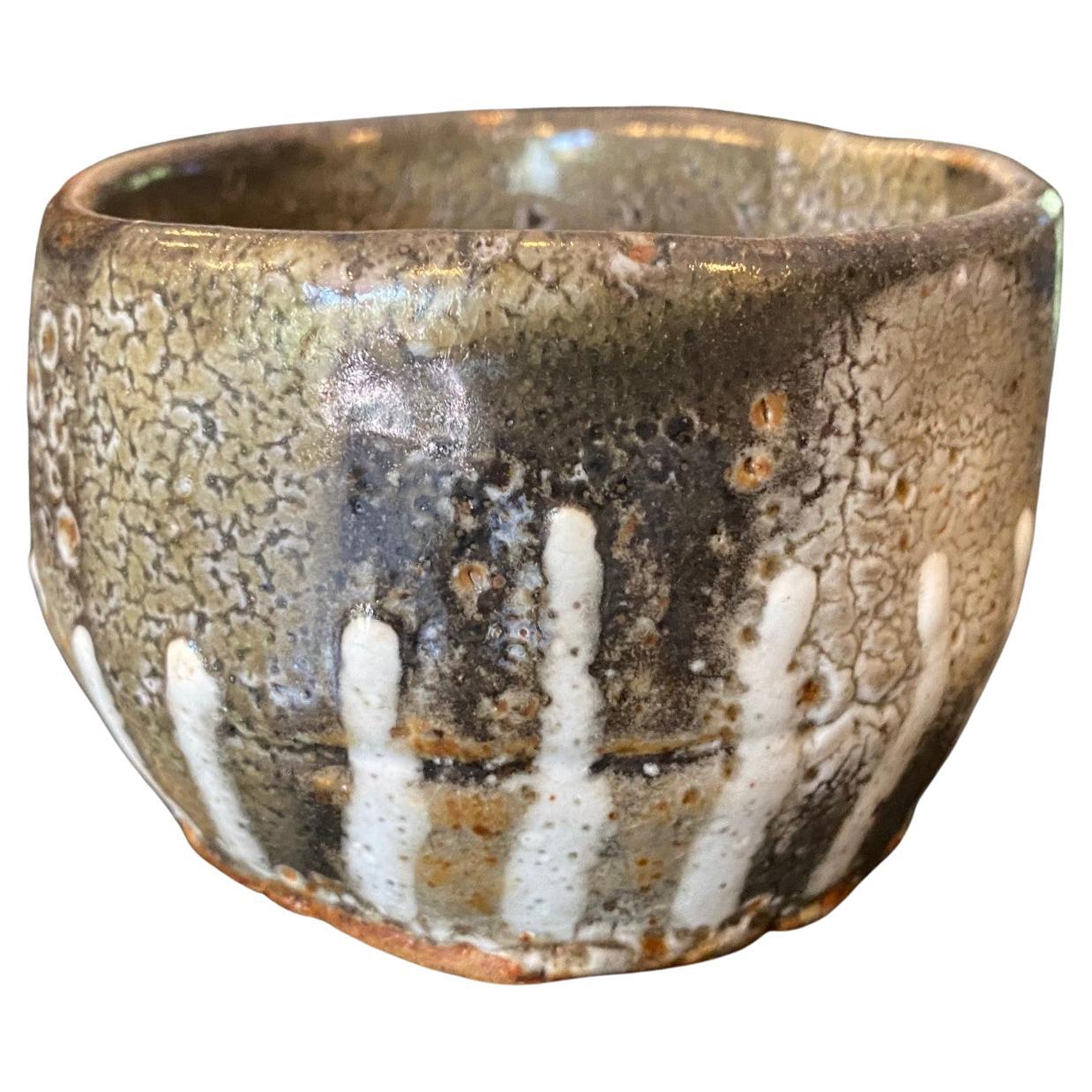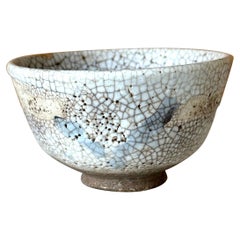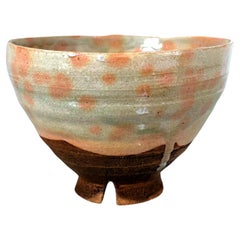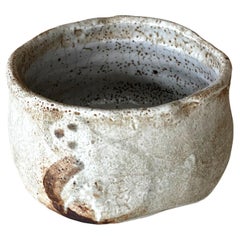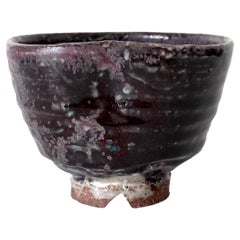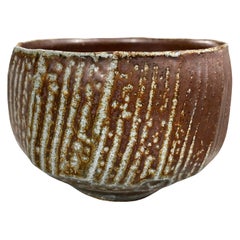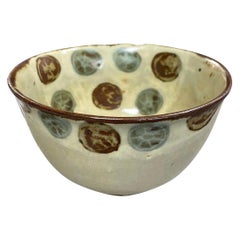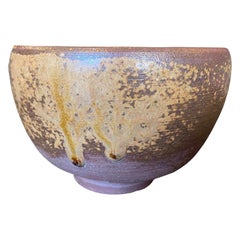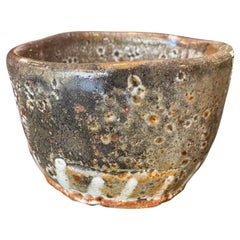Items Similar to Japanese Mino Ware Oribe Type Chawan Tea Bowl
Want more images or videos?
Request additional images or videos from the seller
1 of 17
Japanese Mino Ware Oribe Type Chawan Tea Bowl
$2,600
£1,997.48
€2,295.09
CA$3,657.22
A$4,108.73
CHF 2,146.82
MX$50,148.91
NOK 27,258.28
SEK 25,657.93
DKK 17,126.79
About the Item
A Japanese Kutsu-gata (clog-shaped) chawan (tea bowl) circa 19th century possibly older. The stoneware bowl potted from buff clay has a slight irregular shape and an unusual depth for a tea bowl. Of Mino ware Oribe type, the chawan was entirely covered in a greyish-yellow glaze except the area around the base exposed, showing the mark on the foot ring cut by the potter's knife. The surface was decorated with autumn grasses and subtle green veins that suggest tendrils, painted with quick and confident strokes with iron and green underglaze. The interior of the bowl is glazed with some green color casually splashed and dripped over. The design calls to mind certain type Kyo-Yaki bowls by Ogata Kenzan, which could be the inspiration.
There is a purposedly-built purple fabric form that goes into the tea bowl as a protection, but the original tomobako is now lost. From a US collection.
- Dimensions:Height: 4.5 in (11.43 cm)Diameter: 4.25 in (10.8 cm)
- Style:Meiji (Of the Period)
- Materials and Techniques:Ceramic,Glazed
- Place of Origin:
- Period:
- Date of Manufacture:19th Century
- Condition:Wear consistent with age and use. Fine condition with only shelf wear,.
- Seller Location:Atlanta, GA
- Reference Number:1stDibs: LU945031376242
About the Seller
4.9
Platinum Seller
Premium sellers with a 4.7+ rating and 24-hour response times
Established in 2006
1stDibs seller since 2010
565 sales on 1stDibs
Typical response time: <1 hour
- ShippingRetrieving quote...Shipping from: Atlanta, GA
- Return Policy
Authenticity Guarantee
In the unlikely event there’s an issue with an item’s authenticity, contact us within 1 year for a full refund. DetailsMoney-Back Guarantee
If your item is not as described, is damaged in transit, or does not arrive, contact us within 7 days for a full refund. Details24-Hour Cancellation
You have a 24-hour grace period in which to reconsider your purchase, with no questions asked.Vetted Professional Sellers
Our world-class sellers must adhere to strict standards for service and quality, maintaining the integrity of our listings.Price-Match Guarantee
If you find that a seller listed the same item for a lower price elsewhere, we’ll match it.Trusted Global Delivery
Our best-in-class carrier network provides specialized shipping options worldwide, including custom delivery.More From This Seller
View AllJapanese Shino Chawan Tea Bowl Edo Period
Located in Atlanta, GA
A Japanese ceramic Chawan (tea bowl) of e-Shino (painted Shino) ware style circa mid-late 18th century Edo period. The classically shaped bowl features an abstract blue paint of blue grass and displays strong characters in the milky white glaze, with overall crawling and crackling effect. One of the most distinctive characteristics of Shino that is exemplified on this bowl is the small pinholes called suana, which tea masters favor (termed as yuzuhada, or citron skin). The milky-white feldspar...
Category
Antique Late 18th Century Edo Ceramics
Materials
Ceramic
Japanese Glazed Ceramic Gohon Chawan Tea Bowl
Located in Atlanta, GA
A bespoken Japanese ceramic glazed tea bowl with fabric insert, pouch and original padded wood tomobako box. The chawan has a slightly irregular wall supported by a high notched foot...
Category
Antique 19th Century Japanese Meiji Ceramics
Materials
Ceramic
Antique Japanese Shino Ware Chawan Tea Bowl
Located in Atlanta, GA
On offer is a Japanese ceramic tea bowl (chawan) used in the traditional chado ceremony. The bowl was potted in clog form with a ring foot shaved extremely low. Its size and harmonious proportion make it perfect to be held in both hands during chado. Classified as shino ware...
Category
Antique 18th Century Japanese Edo Ceramics
Materials
Ceramic
Japanese Gohon Glazed Tea Bowl Chawan Meiji Period Ex-Musuem
Located in Atlanta, GA
A Japanese ceramic Gohon tea bowl (Chawan) with a slightly irregular wall circa 18th century of Meiji Period. Supported by a high notched foot ring that was left unglazed, the chawan...
Category
Antique 18th Century Japanese Meiji Ceramics
Materials
Ceramic
Korean Ceramic Chawan Ido Tea Bowl with Soba Glaze Kuroda Touen
Located in Atlanta, GA
This ceramic chawan (tea bowl) was made in Korea during Joseon dynasty circa 18th to early 19th century. The bowl was of a "Small Ido" form with half-he...
Category
Antique Late 18th Century Korean Other Ceramics
Materials
Ceramic
Japanese Ceramic Bowl Makuzu Kozan Utusushi Kenzan
By Makuzu Kozan
Located in Atlanta, GA
A rare ceramic bowl with overglaze paint decoration by Japanese imperial potter Makuzu Kozan ((1842–1916). Unlike the better-known works Kozan made for the expositions in the west and export to the foreign market, this piece exemplifies his work for the domestic market and the tea ceremony. The bowl was made in the so called "Utusushi" Ogata Kenzan (1663-1743), a celebrated Edo painter and ceramicist. Utusushi is loosely translated as "in the spirit of". It is not at all a simple imitation of a master, but a Japanese concept of embracing the spiritual essence of a master while the creator is free to mix in his or her own unique artistic interpretation and flavor.
The bowl was made to hold fruits during the tea ceremony. It has a very distinguished form with a circular lower body morphing into a square upper portion that further opening with flared rim. The surface has a grey glaze onto which Asagao flowers (Japanese morning glory) on the vines were painted in a free and poetic style. White was used for the petals, green for the leaves with touches of gold highlight. Asagao, the symbol of the summer was rendered in the spirit of Ogata Kenzan, and interestingly the shape of the blossom echoes the unique form the bowl. It was likely reserved for the tea ceremony during the summer months.
Under the base, Kozan was signed in black on a white porcelain plaque inlay.
For two similar examples of Kozan's work Utusushi Kenzan, see Page 168-169 of the book: Sekai ni Aisa Reta ya Kimono Miyagawa Kozan Makuzu...
Category
Antique Early 1900s Japanese Japonisme Ceramics
Materials
Ceramic
You May Also Like
Japanese Asian Style Signed Studio Pottery Wabi-Sabi Ceramic Chawan Tea Bowl
Located in Studio City, CA
A stunning Japanese Asian-influenced stoneware Studio Pottery Chawan tea bowl that features a beautiful dark rich glaze with wonderful shifts in pattern and texture.
This particula...
Category
20th Century Japanese Showa Ceramics
Materials
Stoneware
Ogata Kenzan Signed Japanese Asian Edo Period Pottery Tea Bowl Chawan
Located in Studio City, CA
A spectacularly designed and beautifully made Chawan tea bowl dating back to the Edo period. This work is attributed to Ogata Kenzan (1663-1743) who is wi...
Category
Antique 18th Century Japanese Edo Ceramics
Materials
Pottery
Kaneshige Toyo Japanese National Treasure Signed Bizen Pottery Chawan Tea Bowl
Located in Studio City, CA
A beautiful, perfectly shaped antique Bizen ware Chawan tea bowl by renowned Japanese master potter/artist Kaneshige Toyo (1896-1967) featuring a unique one of a kind, natural, organic forming ash glaze. Kaneshige is universally considered to be the founder of modern Bizen Yaki Ware pottery.
In 1956, Kaneshige was certified as a Living National Treasure (Important Intangible Cultural Heritage) for his work in Bizen Ware pottery/ceramics. Bizen Ware is a type of Japanese pottery traditionally from the Bizen province, presently a part of the Okayama prefecture. It is considered one of the Six Ancient Japanese Kilns (along with Echizen ware, Seto ware, Shigaraki ware, Tamba ware, and Tokoname ware).
The piece is signed on the base with one of Kaneshige's traditional incised marks (fundo weight mark of Toyo) .
The work also comes with the original Toyo Kaneshige...
Category
Mid-20th Century Japanese Showa Ceramics
Materials
Pottery, Stoneware
Japanese Asian Signed Studio Pottery Wabi-Sabi Ceramic Glazed Chawan Tea Bowl
Located in Studio City, CA
A gorgeous Japanese studio pottery chawan tea bowl that features a mix of shifting colors, glazes and textures as well as elements of Shino Ware and Hagi Ware. The piece radiates in...
Category
20th Century Japanese Showa Ceramics
Materials
Earthenware, Pottery
Japanese Asian Signed Studio Pottery Wabi-Sabi Ceramic Glazed Chawan Tea Bowl
Located in Studio City, CA
A gorgeous Japanese studio pottery chawan tea bowl that features a mix of shifting colors, glazes and textures as well as elements of Shino Ware and Hagi Ware. The piece radiates in...
Category
20th Century Japanese Showa Ceramics
Materials
Earthenware, Pottery
Kaneshige Toyo National Treasure Signed Japanese Bizen Pottery Chawan Tea Bowl
Located in Studio City, CA
A beautiful, perfectly shaped antique Bizen ware Chawan tea bowl by renowned Japanese master potter/artist Kaneshige Toyo (1896-1967) featuring a unique natural, organic forming ash glaze. Kaneshige is universally considered to be the founder of modern Bizen pottery.
In 1956, Kaneshige was certified as a Living National Treasure (Important Intangible Cultural Heritage) for his work in Bizen Ware pottery/ceramics. Bizen Ware is a type of Japanese pottery traditionally from the Bizen province, presently a part of the Okayama prefecture. It is considered one of the Six Ancient Japanese Kilns (along with Echizen ware, Seto ware, Shigaraki ware, Tamba ware, and Tokoname ware).
The piece is signed/ sealed on the base with one of Kaneshige's traditional incised marks.
A rather engaging and scarce work. Would be a fantastic addition to any Japanese/Asian pottery or Bizen Ware collection or eye-catching stand-alone work in about any setting.
Kaneshige's work can be found in numerous prominent collections and museums including:
Aichi Prefectural Ceramic Museum, Seto, Japan
Brooklyn Museum, NY
Hagi Uragami Museum, Yamaguchi, Japan
Honolulu Art Museum, HI
Ibaraki Ceramic Art Museum, Kasama, Japan
Indiana Art...
Category
Mid-20th Century Japanese Showa Ceramics
Materials
Stoneware
More Ways To Browse
Japanese Fabric Art
Japanese Antique Marks
Japan Ware
Green Ware
Antique Iron Glaze
Japanese Tea Bowl
Green Footed Bowl
Japanese Meiji Bowl
Antique Japanese Rings
Yellow Ware
Green Drip Glaze
Brown Japanese Ceramic Bowl
Antique Japanese Stoneware
Antique Japanese Tea Bowl
Japanese Chawan
Japanese Stoneware Bowl
Antique Stoneware Bowls
Antique Clogs
